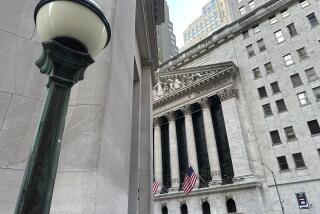Dow Retreats Below 11,000 on Rate Fears
Stocks ended broadly lower Tuesday after Monday’s surge, as bond investors--wary about the strong U.S. economy--pushed long-term Treasury yields to their highest level since last summer.
The Dow Jones industrial average fell 128.58 points, or 1.2%, to 10,886.11, after rocketing 225 points on Monday to a record 11,014.69.
Other major indexes also fell, with the Nasdaq composite losing 2% to 2,485.12 and the Standard & Poor’s 500 off 1.7%.
But selling was concentrated in big-name stocks. In the broad market, losers had only an 8 to 7 margin over winners on the New York Stock Exchange.
S&P;’s index of mid-size stocks fell just 0.5%, and the S&P; small-stock index was unchanged.
Wall Street was jittery after bond yields rose, reflecting growing concerns that the strong economy will eventually force the Federal Reserve to raise interest rates.
The Conference Board reported that a key gauge of future economic activity rose for the sixth straight month in March. And a separate government report showed housing activity still booming.
The 30-year Treasury bond yield, a benchmark for long-term rates in general, ended at 5.71%, up from 5.65% Monday and the highest since July 31. Shorter-term yields also rose, though modestly.
“The market is truly more wary” that brisk growth will quicken inflation and force the Fed’s hand, said Susan Huang at Chase Asset Management.
Merrill Lynch market strategist Richard Bernstein in New York on Tuesday slashed the bond weighting in his recommended portfolio to 30% from 50%, and raised “cash” holdings from 10% to 30%. Stocks remain at 40% of the recommended asset mix.
Bernstein said he made the move on the assumption that interest rates have further to rise.
Since Jan. 1 the 30-year T-bond yield has jumped 0.61 percentage point, from 5.1%.
Although the stock market has largely ignored the rise in rates so far--mainly because the increase has been gradual--”the interest rate problem is a problem that can take everything down,” warned Robert Robbins, analyst at brokerage Robinson-Humphrey in Atlanta.
And because stocks are trading at very expensive levels right now, they are vulnerable to anything negative, Robbins noted.
Treasury yields also are being hurt by competition from corporate debt, as companies line up to borrow. Fannie Mae, the biggest holder of U.S. home mortgages, is expected to sell as much as $4 billion of debt soon.
Among Tuesday’s highlights:
* Auto stocks were sharply lower, led by GM, which reported lower April sales despite gains by other car makers. GM shares plunged $4.75 to $89. Rival Ford slid $2.56 to $64.13.
* Consumer growth stocks bore the brunt of profit-taking in blue chips. Wal-Mart lost $2.13 to $44, Procter & Gamble dropped $2.50 to $91.75 and American Express fell $6.25 to $127.13.
* Industrial shares, market leaders recently, were mixed. Georgia-Pacific tumbled $4.75 to $90.75 and PPG Industries lost $1.69 to $66.63, but Emerson Electric added 81 cents to $67.25 and USX-US Steel gained $2.13 to $32.44.
* Retailer Limited’s shares rocketed $5.25 to $49.88 as the market reacted to the company’s latest restructuring moves.
* Many Internet names continued to lose ground. EBay fell $9.38 to $181.25, Inktomi dropped $9.25 to $108 and America Online was off $6 to $127.13.
Market Roundup, C9
(BEGIN TEXT OF INFOBOX / INFOGRAPHIC)
Yields Rebound
The yield on the bellwether 30-year Treasury bond on Tuesday reached its highest level since last summer. Monthly closes and latest:
Tuesday: 5.71%
Source: Bloomberg News
More to Read
Inside the business of entertainment
The Wide Shot brings you news, analysis and insights on everything from streaming wars to production — and what it all means for the future.
You may occasionally receive promotional content from the Los Angeles Times.










